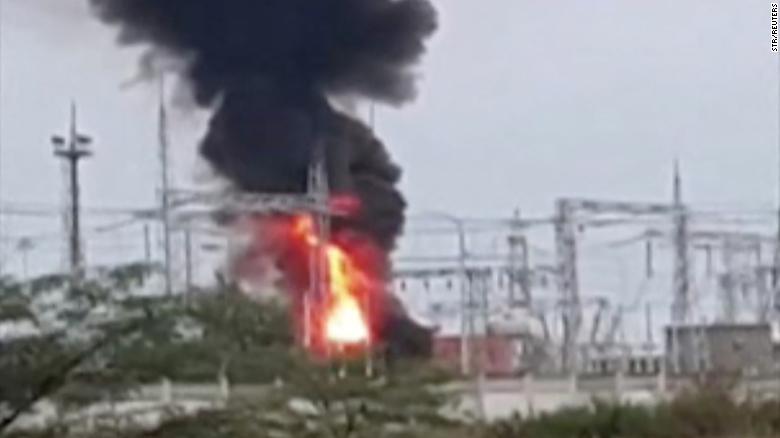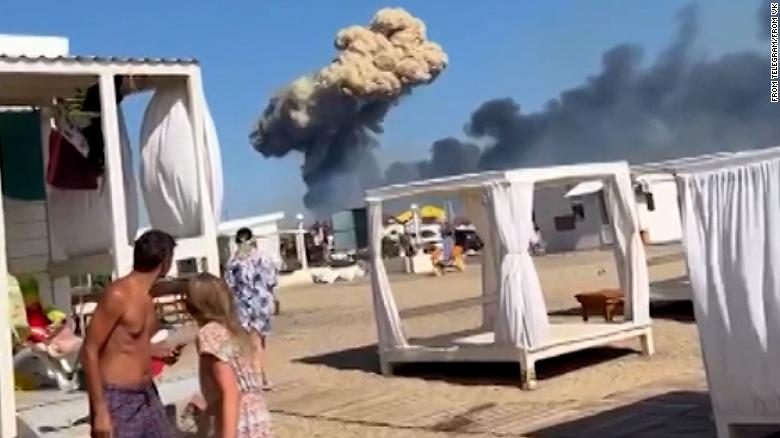Ukraine was behind three explosions that rocked Russian military facilities in the annexed province of Crimea this past week, including an explosion at a Russian air base on the peninsula’s west coast that wrecked several airplanes, according to a Ukrainian government report circulated internally and shared with CNN by a ​Ukrainian official. ​
The official requested anonymity because they were not authorized to share the information with the media.
The report describes the Saki airbase, which was rocked by explosions last Tuesday, as a hard but one-time loss for Russian military infrastructure in the peninsula, with subsequent attacks as proof of Ukraine’s systematic military capability in targeting Crimea.
The August 9 incident at Saki airbase, which destroyed at least seven military aircraft, severely damaged the base, and killed at least one person​.
Russia claimed it was a result of an accident and Ukrainian officials have so far declined to confirm on the record that they were responsible. What caused the explosions remains unclear.
In a speech following the incident, Ukrainian President Volodymyr Zelensky said the war “began with Crimea and must end with Crimea — its liberation.”​
Another set of explosions were reported in Crimea this week, on August 16, this time at an ammunition depot in Maiske and at an airfield in Gvardeyskoe.
Russian officials said the incident in Maiske had been the result of sabotage​, but they did not specify the kind of sabotage, or whom they believed was responsible.
What do we know about other recent incidents?
On Tuesday, a fire and smoke plume were seen rising from an electrical substation 12 miles away from Maiske’s ammunition depot, according to social media footage. The cause of the fire, and smoke, at the substation remains unclear.
The incidents both took place around the Dzhankoi area, described by the British Ministry of Defence as “a key road and rail junction that plays an important role in supplying Russia’s operations in southern Ukraine.”

The attacks come at a time when nascent resistance movement in Russian occupied areas appears to have been carrying out acts of sabotage.
Over the weekend, Ukrainian officials said that a railway bridge near the southeastern Ukrainian city of Melitopol, used by Russians to transport military equipment and weapons from occupied Crimea, was blown up by Ukrainian partisans. Melitopol has for months been a center of underground resistance to Russian occupation.
As analysts speculate that there is a campaign to degrade Russia’s military capability in Crimea, Zelensky warned Ukrainians living in occupied areas on Tuesday to stay clear of Russian forces’ military facilities.
What do the blasts mean for Putin’s ambitions?
The explosions at Saki airbase jolted sunbathers lounging in beach-side cabanas last week, and marked the start of a series of mysterious incidents on the Ukrainian peninsula that threatens the jewel of President Vladimir Putin’s revanchist ambitions.
Western officials and analysts have since offered competing explanations about the cause.
In any event, the Cavell Group said, the “Saki attack was audacious and highly effective in both damaging Russian reinforcements and striking a significant psychological blow to morale amongst the Russian military and civilians.”

Whatever caused the explosions, they could have significant implications for the overall conflict, especially if the attack were to have been carried out with any new long-range weapon system that Ukraine has developed.
The UK Ministry of Defence says that the loss of combat jets represents a minor proportion of the overall fleet of aircraft Russia has available to support the war.
But it noted that Saki is the main base for supporting the Russian navy in the Black Sea. “The fleet’s naval aviation capability is now significantly degraded. The incident will likely prompt the Russian military to revise its threat perception,” it said.
It may also cause a re-evaluation of the threat to Crimea which “has probably been seen as a secure rear-area,” the ministry said.
Source: CNN
